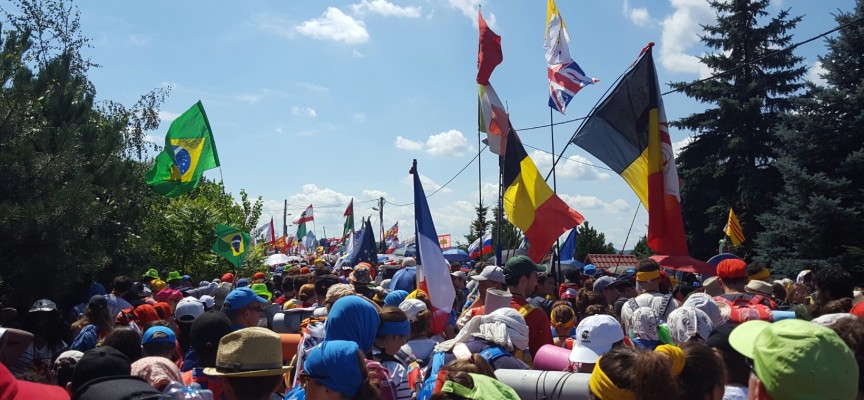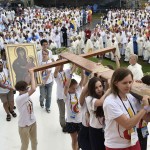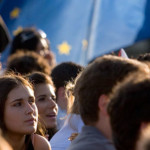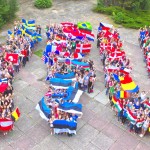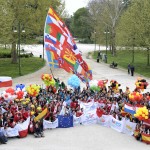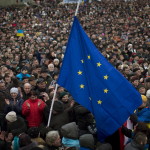What message will young people in Europe bring to Europe after the experience of World Youth Day in Krakow? To what extent will this global event leave traces? What consequences will the words of Pope Francis have specifically in the European context ransacked in several places and for different reasons?
At the resumption of their commitments to research and work what extra soul will young people bring to the society, culture and politics of individual European countries, of the European Union and more broadly of Europe? Who will accompany them?
This is obviously not an interrogation to anyone but questions that would like to become tracks along the path towards the future.
No coincidence that on top of all the question marks is that “But are you able to dream?” with which Pope Francis has shaken the “quietists”, the “retired” at a young age, the lovers of the “couch, those who are of short stature (not physical) and so cannot see beyond themselves”…
Actually, here is a first crucial message to young Europeans so that they do not interrupt, as the adults partially did, the “European” dream of those who for the new generations are the “grandfathers” of the common European home.
That dream that is seventy years old will obviously not have to be a “cut and paste” but challenged by the reality of today, will be able to keep alive the colours of solidarity, reconciliation, justice and peace.
Among the many flags being waved at the “Campus misericodiae”, suddenly appeared on July 31st the European one, to remember, as a banner with stars of gold colour can, a commitment, a thought, a hope.
A really small sign, a sudden appearance and equally suddenly confused with other flags being proudly waved to represent the identities of more than one million citizens of the world.
A beautiful picture of how many different beauties can become a beauty not unique but unified.
Is it possible that a magnificent spectacle of the conviviality of differences where emotions are called to become choices of responsibility cannot cause any “good vibrations” in the tired, old Europe?
“How do you want to return to your homes tonight, to your place of accommodation, to your tents?” had asked Pope Francis July 29th. “How would you like to go back tonight to your Europe?” is the question that has come spontaneously seeing the European flag waving vigorously among other thousands.
We are in the dream, certainly we are, but of what is called back by Pope Francis, by the Holy Scripture, by men and women with great thoughts and actions.
Never an escape from reality, never a trespassing from utopia and even less in craziness but always a supplement of soul in the most difficult and dark hours.
Europe needs these young people to exit the eclipse that for too long has hidden it.
And who knows, maybe you could see in the 2019 World Youth Day in Panama the flag of every European country waving tightened to the European flag, on the unique shaft of solidarity.
Quale messaggio i giovani europei porteranno all’Europa dopo l’esperienza della Gmg a Cracovia? In quale misura questo evento mondiale lascerà tracce? Le parole di papa Francesco quale ricaduta avranno nello specifico contesto europeo messo a soqquadro in più punti e per diversi motivi?
Alla ripresa dei loro impegni di studio e di lavoro quale supplemento d’anima porteranno i giovani alla società, alla cultura e alla politica dei singoli Paesi europei, dell’Unione europea e più ampiamente dell’Europa? Chi li accompagnerà?
Non si tratta ovviamente di un interrogatorio cui sottoporre qualcuno ma di domande che vorrebbero diventare tracce lungo il sentiero verso il futuro.
Non a caso in cima a tutti i punti interrogativi c’è quel “Ma voi siete capaci di sognare?” con il quale papa Francesco ha scosso i “quietisti”, i “pensionati” in giovane età, gli amanti del “divano, coloro che sono di bassa statura (non fisica) e così non riescono a vedere oltre se stessi…”.
In realtà qui c’è un primo fondamentale messaggio ai giovani europei perché non interrompano, come hanno in parte fatto gli adulti, il “sogno” europeo di coloro che per le nuove generazioni sono i “nonni” della casa comune europea.
Quel sogno che compie settant’anni non dovrà ovviamente essere un “copia e incolla” ma, sfidato dalla realtà di oggi, potrà mantenere vivi i colori della solidarietà, della riconciliazione, della giustizia, della pace.
Tra le molte bandiere che sventolavano al “Campus misericordiae” improvvisamente è apparsa, il 31 luglio, quella europea a ricordare, come può farlo un drappo azzurro con le stelle colore dell’oro, un impegno, un pensiero, una speranza.
Un piccolissimo segno, un improvviso apparire e un altrettanto repentino confondersi con le altre bandiere orgogliosamente sventolate per rappresentare le identità di oltre un milione di cittadini del mondo.
Uno stupenda immagine di come tante diverse bellezze diverse possono diventare una bellezza non unica ma unitaria.
Possibile che un magnifico spettacolo di convivialità delle differenze, dove le emozioni sono chiamate a diventare scelte di responsabilità, non possa provocare “buone vibrazioni” nella stanca e vecchia Europa?
“Come volete tornare questa sera alle vostre case, ai vostri luoghi di alloggio, alle vostre tende?”, aveva chiesto il 29 luglio papa Francesco. “Come volete tornare questa sera alla vostra Europa?”, è la domanda che è venuta spontanea nel vedere quella bandiera europea sventolare gagliarda tra le altre mille.
Siamo nella dimensione del sogno, certamente sì, ma di quello che è richiamato da papa Francesco, dalla Sacra Scrittura, da uomini e donne dai pensieri e dalle azioni grandi.
Mai una fuga dalla realtà, mai uno sconfinamento nell’utopia e ancor meno nella follia, ma sempre un supplemento d’anima nelle ore più difficili e buie.
Di questi giovani ha bisogno l’Europa per uscire dall’eclissi che da troppo tempo la nasconde.
E chissà, forse si potrebbe vedere nel 2019 alla Gmg di Panama la bandiera di ogni Paese europeo sventolare insieme con la bandiera europea, strette sull’unica asta della solidarietà.
Paolo Bustaffa
Latest posts by Paolo Bustaffa (see all)
- Europe in Aldo Moro’s project - 31 dicembre 2016
- Ventotene: a cultural alliance between generations is urgent for the EU - 3 settembre 2016
- That flag in the Wyd - 7 agosto 2016

